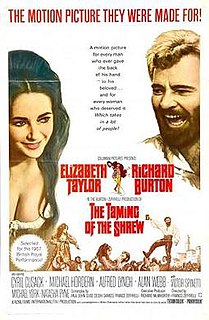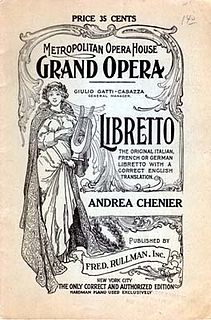
Kiss Me, Kate is a musical written by Samuel and Bella Spewack with music and lyrics by Cole Porter. The story involves the production of a musical version of William Shakespeare's The Taming of the Shrew and the conflict on and off-stage between Fred Graham, the show's director, producer, and star, and his leading lady, his ex-wife Lilli Vanessi. A secondary romance concerns Lois Lane, the actress playing Bianca, and her gambler boyfriend, Bill, who runs afoul of some gangsters. The original production starred Alfred Drake, Patricia Morison, Lisa Kirk and Harold Lang.

The Fair at Sorochyntsi is a comic opera in three acts by Modest Mussorgsky, composed between 1874 and 1880 in St. Petersburg, Russia. The composer wrote the libretto, which is based on Nikolai Gogol's short story of the same name, from his early (1832) collection of Ukrainian stories Evenings on a Farm near Dikanka. The opera remained unfinished and unperformed at Mussorgsky's death in 1881.

Anastasio Martín Ignacio Vicente Tadeo Francisco Pellegrin Martín y Soler was a Valencian composer of opera and ballet. Although relatively obscure now, in his own day he was compared favorably with his contemporary, Wolfgang Amadeus Mozart, as a composer of opera buffa. In his time he was called "Martini lo spagnuolo" ; in modern times, he has been called "the Valencian Mozart". He was known primarily for his melodious Italian comic operas and his work with Lorenzo Da Ponte in the late 18th century, as well as the melody from Una cosa rara quoted in the dining scene of Mozart's Don Giovanni.
Russian opera is the art of opera in Russia. Operas by composers of Russian origin, written or staged outside of Russia, also belong to this category, as well as the operas of foreign composers written or intended for the Russian scene. These are not only Russian-language operas. There are examples of Russian operas written in French, English, Italian, Latin, Ancient Greek, Japanese, or the multitude of languages of the nationalities that were part of the Empire and the Soviet Union.
Sergei Mikhailovich Slonimsky is a Russian and Soviet composer, pianist and musicologist.

Catterino Albertovich Cavos, born Catarino Camillo Cavos, was an Italian composer, organist and conductor settled in Russia. He played an important role in the history of Russian opera and was the father of Alberto Cavos.

Kiss Me Kate is a 1953 Metro-Goldwyn-Mayer film adaptation of the Broadway musical of the same name.

The Taming of the Shrew is a 1967 American-Italian romantic comedy film based on the play of the same name by William Shakespeare about a courtship between two strong-willed people. The film was directed by Franco Zeffirelli and stars Elizabeth Taylor and Richard Burton as Shakespeare's Kate and Petruchio.
Glafira Vladimirovna Deomidova is a Russian soprano who sang at the Bolshoi Theatre company from 1956 to 1977.

The Moscow State Academic Chamber Musical Theatre is a Moscow theatre and opera house. The theatre was founded in 1971 and carries the name of its founder Boris Alexandrovich Pokrovsky. The theatre troupe resident at the theatre is also known as the "Pokrovsky Opera".

Catharine and Petruchio is a reworking of William Shakespeare's The Taming of the Shrew by British playwright and actor David Garrick. It was written in 1754 and was performed far more often than the original The Shrew through the eighteenth and nineteenth centuries.
There have been numerous on screen adaptations of Shakespeare's The Taming of the Shrew. The best known cinematic adaptations are Sam Taylor's 1929 The Taming of the Shrew and Franco Zeffirelli's 1967 The Taming of the Shrew, both of which starred the most famous celebrity couples of their era; Mary Pickford and Douglas Fairbanks in 1929 and Elizabeth Taylor and Richard Burton in 1967. On television, perhaps the most significant adaptation is the 1980 BBC Television Shakespeare version, directed by Jonathan Miller and starring John Cleese and Sarah Badel.
The Taming of the Shrew in performance has had an uneven history. Popular in Shakespeare's day, the play fell out of favour during the seventeenth century, when it was replaced on the stage by John Lacy's Sauny the Scott. The original Shakespearean text was not performed at all during the eighteenth century, with David Garrick's adaptation Catharine and Petruchio dominating the stage. After over two hundred years without a performance, the play returned to the British stage in 1844, the last Shakespeare play restored to the repertory. However, it was only in the 1890s that the dominance of Catharine and Petruchio began to wain, and productions of The Shrew become more regular. Moving into the twentieth century, the play's popularity increased considerably, and it became one of Shakespeare's most frequently staged plays, with productions taking place all over the world. This trend has continued into the twenty-first century, with the play as popular now as it was when first written.
The Taming of the Shrew is an opera in three acts by composer Vittorio Giannini. The work uses an English language libretto by Dorothy Fee and the composer which is based on William Shakespeare's play of the same name. The opera premiered at the Cincinnati Music Hall on January 31, 1953 in a concert performance starring Dorothy Short as Katharina, Robert Kircher as Petruchio, the Cincinnati Symphony Orchestra, and conductor Thor Johnson. Considered Giannini's most popular work, it was one of three finalists named for the Pulitzer Prize for Music in 1953.

The Great Friendship is a 1947 opera by Vano Muradeli, to a libretto by Georgi Mdivani. It was premiered in Donetsk on 28 September 1947 and given its Moscow premiere at the Bolshoi Theatre, on 7 November 1947. Joseph Stalin attended a performance at the Bolshoi on 5 January 1948, and strongly disapproved of the opera. This led to a significant purge, often referred to as the Zhdanovshchina, of the musical life of the Soviet Union.
Lutfi Rahimjonovna Kabirova, PAU, was a Tajikistani opera singer of the Soviet era.
















